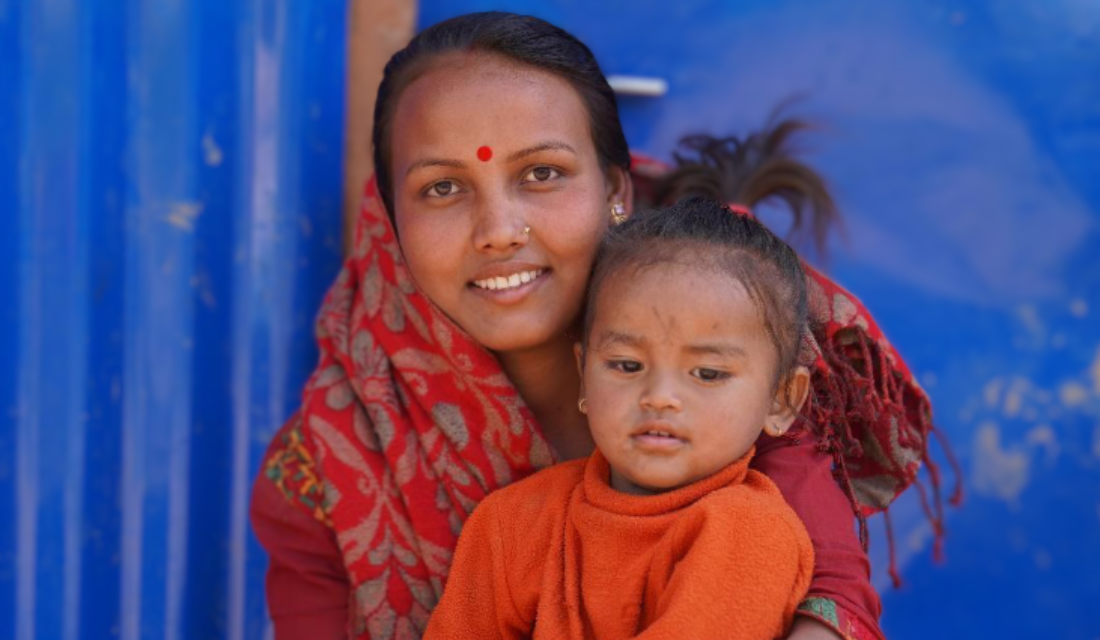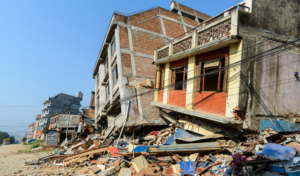Local Partners Provide Fast, Culturally Sensitive Disaster Response in Nepal

Episcopal Relief & Development works through a global network of local faith and community partners to support people impacted by natural disasters and to provide a swift response when time is of the essence. This is especially important when the affected communities are located in remote or difficult to reach locations, as in 2023 when a 6.4 magnitude earthquake hit the mountainous Jajarkot District in Nepal.
“There were five people in the house when the earthquake struck,” said Sita, a young mother who was in bed with her 15-month-old daughter at the time. “We were trapped in the house,” she explained, “but luckily none of us was severely injured.” Nonetheless, the house she and her family lived in was destroyed, basic items like warm clothes buried and inaccessible.
Many of Sita’s neighbors reported similar experiences. “Although my house had remained undamaged in previous tremors,” one woman said, “it was completely destroyed this year.” Approximately 157 people in the area lost their lives and hundreds of others were injured.
Episcopal Relief & Development partner DanChurchAid (DCA), together with local partner SOSEC Nepal, rapidly deployed life-saving support and essential provisions like food, hygiene kits, blankets, mattresses and tents to survivors like Sita.

However, because the earthquake struck in November, temperatures in the area were dipping. Tents wouldn’t suffice for long. Partner staff on the ground knew the clock was ticking to construct transitional shelters that would provide more suitable accommodations for people and families whose homes were destroyed. An assessment of the situation showed that the highest priority level was people with disabilities, elderly people, people with chronic illnesses, and pregnant and lactating women.
“To share my experience,” Sita said, “as a young mother, staying in a tent didn’t feel safe enough. It was terrifying. So, I went to stay with other ladies in the village during that time.”
With support from Episcopal Relief & Development and DCA, local partner SOSEC quickly deployed professional masons to begin planning and construction. Sita noted this agile response and reported that the transitional shelters were quickly completed for herself and her family, along with 26 other families in the community.
As part of the process, families were consulted regarding household needs and cultural considerations that should be accounted for in shelter design. For example, because many men—like Sita’s husband—leave the community for seasonal work in India, it’s important that temporary shelters provide safe, separate sleeping areas to protect and uphold the dignity of women and girls.
“But now, after DCA and SOSEC built the temporary shelters, I have my own room. I feel safe now, since I have a latch on the door.”
– Sita
Sita shared: “Before the earthquake, our house was built in the traditional style and there were not separate rooms.” She explained that this lack of privacy, especially since she’s become a mother and started breastfeeding, caused her significant psychological stress.
“But now,” she said, “after DCA and SOSEC built the temporary shelters, I have my own room. I feel safe now, since I have a latch on the door.”
In addition to facilitating the community-led design of shelters, the program partnership with DCA also addresses the psychological toll taken on survivors like Sita by providing psychosocial counseling services.
Today, Sita and her daughter–now almost two years old–are doing well. They’re still living in temporary housing, she explained and her husband continues to live abroad for employment. Lately, Sita has been looking for work, too, to add to the family income.
They feel secure in temporary housing, Sita explained, but it’s not her ultimate goal. “Getting back into a house like before,” she said, “with my daughter and my husband. That’s my top priority.”
Learn more about how Episcopal Relief & Development works through a global network of local faith and community partners to support people impacted by disasters and other crises like conflict.


